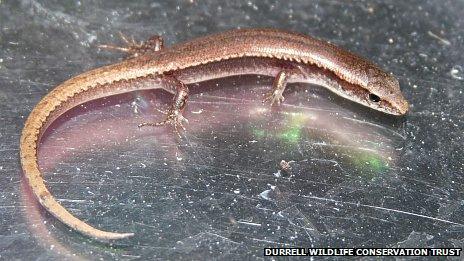Durrell's breeding success for endangered orange-tailed skinks
- Published

The species is only found at the Durrell Wildlife Conservation Trust and at a reserve in Mauritius, a spokesman said
Three critically endangered reptiles have exceeded expectations by staff at Jersey's Durrell Wildlife Conservation Trust by producing 16 young in four months.
The female orange-tailed skinks are part of a group of 22 which were rescued from Mauritius following the invasion of a predatory shrew.
A trust spokesman said the only other population of skinks live in Mauritius.
The young give the species a "real chance for the future", he added.
A further four eggs are currently incubating at the trust.
'Wildest dreams'
The spokesman said: "Female skinks produce only two large eggs at one time.
"The trio were the only females out of 22 rescued... that were able to breed - the others were still too small or male."
Matt Goetz, head of Durrell's herpetology department, said: "Even in our wildest dreams we couldn't have hoped that the females would get off to such a flying start.
"We are delighted that population numbers of the orange-tailed skink in Jersey are increasing so rapidly."
In 2008, the trust helped to move 82 skinks to the Mauritian nature reserve, Gunner's Quoin, and a further 390 in 2010.
Dr Nik Cole, Durrell's team leader in the Mauritian reptile project, said: "Aside from the population at Durrell, the only surviving orange-tailed skinks are present on Gunner's Quoin and it will be years before we know whether the translocation there has been a success.
"That is what makes the safety net population of this critically endangered reptile so important and in turn what makes the news about the breeding trio of females such a delight."
- Published8 August 2012
- Published10 January 2012